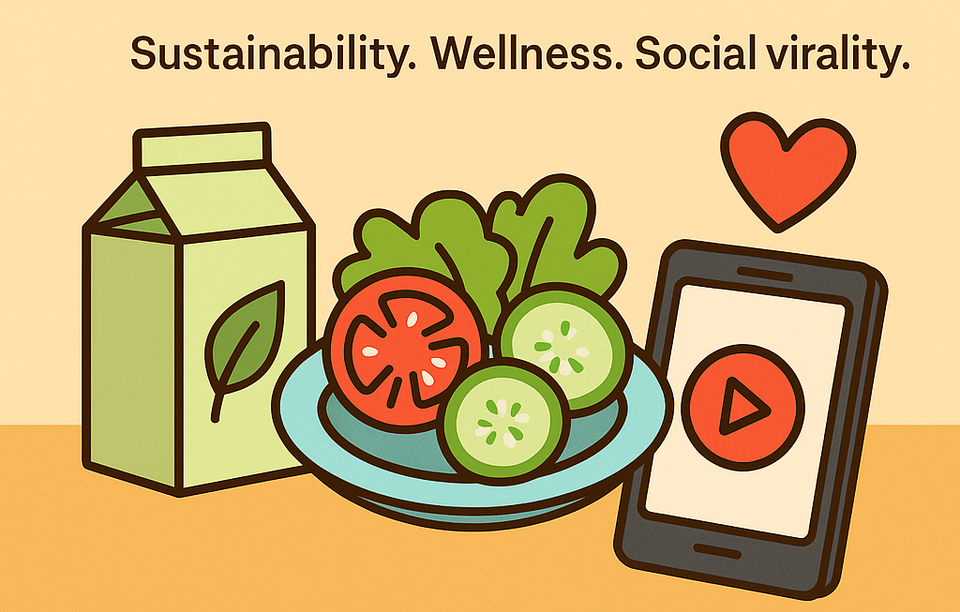How Gen Z Is Redefining America’s Food Market – One Bite at a Time

Summary
Gen Z is driving a food revolution in the U.S., prioritizing sustainability, health, and creativity.
They’re replacing meat with plant-based options and discovering recipes on TikTok.
Want to understand where the food market’s headed next? Start by watching what Gen Z is eating.
Introduction
Over 70% of Gen Z consumers say sustainability is important in their food choices.
From viral Korean snacks to plant-based keto diets, Gen Z isn’t just consuming — they’re influencing what gets made, how it’s marketed, and what sells.
Let’s unpack the data and explore the consumer values driving the next era of food.
The Numbers Behind the Shift
1. Sustainability First
Gen Z doesn’t just care about taste — they care about impact.
In a 2024 Attest survey, over 70% of Gen Z said sustainability is important or very important when making food choices.
This value is showing up in their actual behavior.
Top Motivations:
- Shifting from meat to plant-based products
- Buying from local farmers markets
- Reducing food waste and supporting ethical brands

But are these values reflected in their behavior?
Yes — and here’s the proof.

Actions Taken in the Past Year:
- 27% bought more locally sourced food
- 24% reduced meat consumption
- 23% cut down on ultra-processed food
- Others shifted to plant-based or sustainably labeled products
Sustainability isn't just a belief for Gen Z — it's a behavior. And it's reshaping what goes on the shelf.
2. Social Media = Food Media
TikTok and Instagram are the new Food Network.
More than 70% of Gen Z prefers discovering food trends through social media.
Here’s where they go:
- TikTok: 50.5%
- Instagram: 43.1%
- YouTube: 42.7%
- Facebook, Pinterest, X trail behind
Case in point: Korean dishes like dalgona coffee and buldak noodles went viral on TikTok and became mainstream grocery staples.

3. Health is the New Convenience
Forget greasy fast food — Gen Z wants food that makes them feel better, mentally and physically.
Key trends:
- 3 in 4 Gen Zers link food choices to mental wellness
- 60% say they eat less fast food for this reason
- Popular terms: “all-natural,” “fresh,” “clean label,” and “high protein”
The U.S. wellness food market hit $250B in 2023 and is growing at 9.4% annually (Grand View Research).
Keto culture is also booming:
The U.S. keto food market hit $10B in 2023 and is projected to reach $16.9B by 2033 (Exactitude Consultancy).
💡 You’ve probably seen the term “keto” on snack bars, drinks, or even coffee creamers — but what exactly does it mean?
Keto refers to the ketogenic diet, a low-carb, high-fat eating style that puts the body into a state called ketosis, where fat becomes the main energy source instead of carbs.
Keto-friendly foods typically:
- Contain little to no sugar or refined carbs
- Are high in healthy fats like nuts, cheese, avocados, or MCT oil
- Emphasize protein and fiber for sustained energy
Why It Matters
The rise of Gen Z is pushing food producers and retailers to rethink everything:
- Labels must be cleaner, ingredient sourcing must be ethical
- Product development must align with digital storytelling
- Marketing must be native to TikTok and Instagram
This isn’t a passing trend — it’s the new baseline.
Takeaways
- Sustainability is now a purchase driver, not just a buzzword.
- Social platforms are shaping food innovation and buying behavior.
- Health-driven choices are redefining value — even at a higher price point.
- Brands that tap into Gen Z's values through engaging, authentic content will lead the next decade of food innovation.



